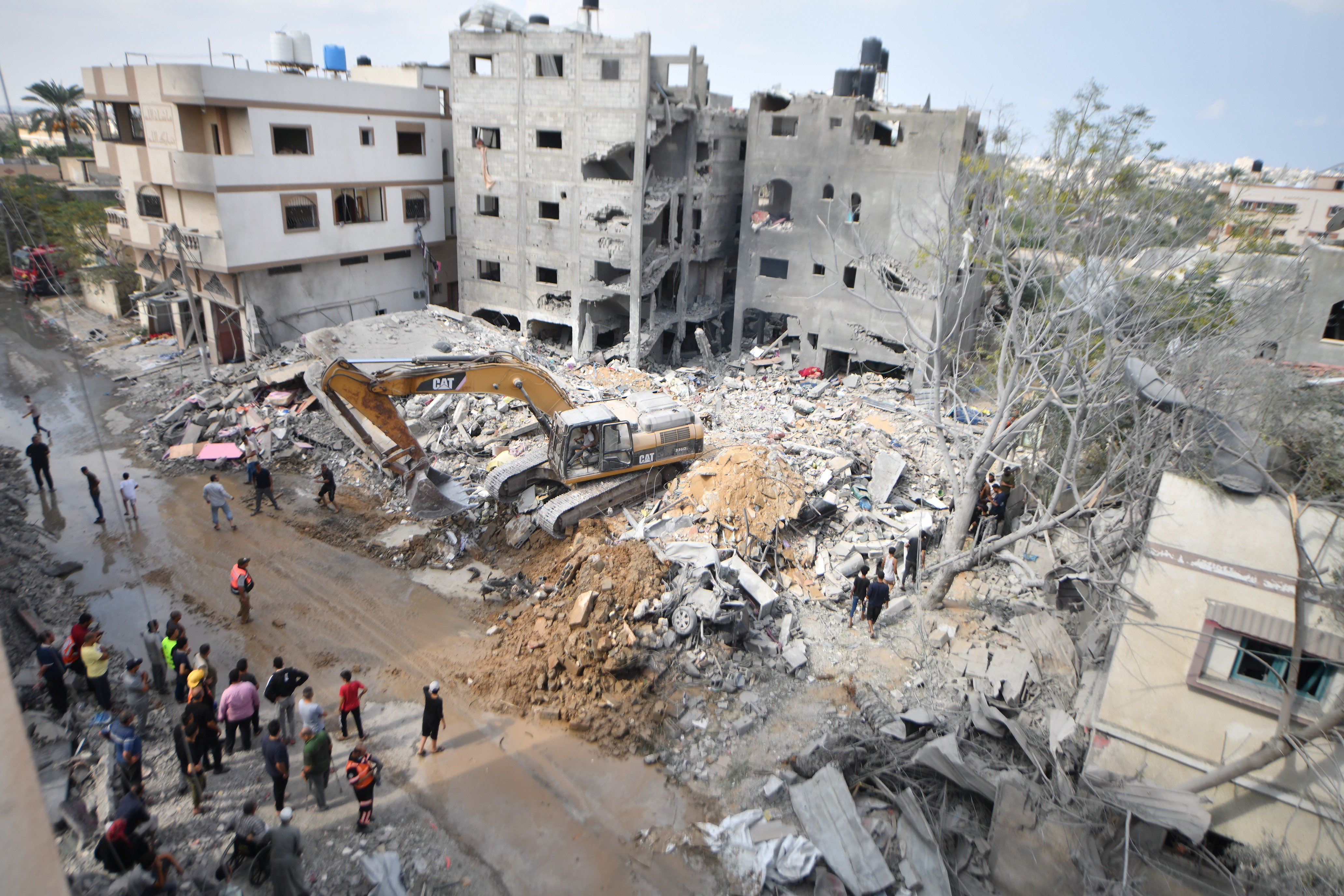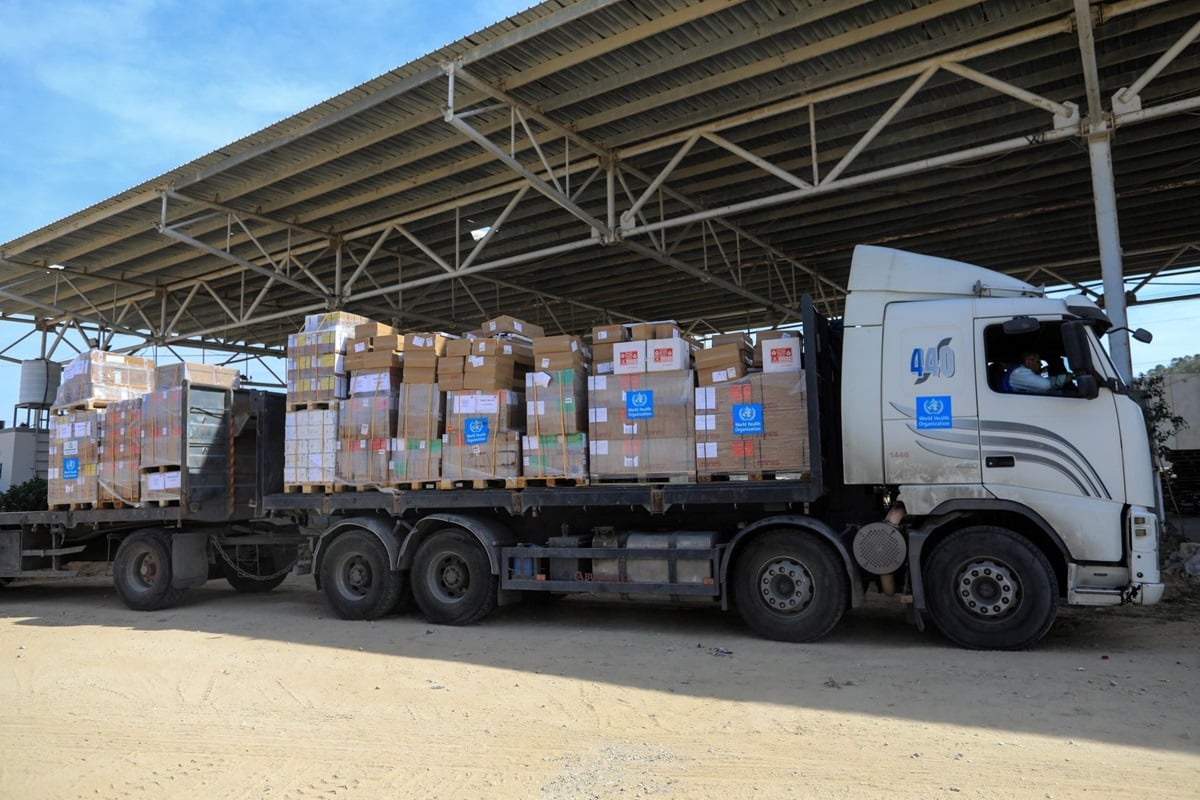Aid Flow Resumes To Gaza Through Egypt's Opened Border Crossing
On Saturday, aid flow resumes to Gaza through Egypt's Opened Border Crossing, enabling much-needed supplies to enter the blockaded Palestinian enclave for the first time since Israel shut it down and started bombing it during Hamas' violent assault two weeks ago.
Author:Suleman ShahReviewer:Han JuOct 23, 2023185 Shares184.8K Views

On Saturday, aid flow resumes to Gaza through Egypt's Opened Border Crossing, enabling much-needed supplies to enter the blockaded Palestinian enclave for the first time since Israel shut it down and started bombing it during Hamas' violent assault two weeks ago.
Food Supply In Gaza
Despite the tremendous scale of the humanitarian situation, just 20 trucks were permitted in. There have been around 200 trucks with a total of 3,000 tons of assistance sitting nearby for days.
Half of Gaza's Palestinian population of 2.3 million has evacuated its homes, leaving them to ration food and drink contaminated water.
In the midst of a power outage throughout the territory, hospitals have reported running short on medical supplies and gasoline for emergency generators.
The Hamas-controlled HealthMinistry said that five hospitals had shut down due to a lack of fuel and bomb damage.
Israeel Plans About Gaza
The health care system in Gaza, according to Doctors Without Borders, is "facing collapse." There is growing speculation that Israel will launch a ground attack to eliminate Hamas.
Israel has promised to destroy Hamas but has provided few specifics about its plans for Gaza should it be successful. To prevent Palestinians from approaching the border and causing unrest, a "buffer zone" should be established in Gaza.
As a result of arrest raids, assaults by Jewish settlers, and gun battles with Israeli soldiers, tensions have been rising in the West Bank.
In an effort to prevent assaults, Israeli soldiers have clamped down on the West Bank, barring entry points and checkpoints connecting towns.
Even though Hamas has freed at least one American mother and her adolescent daughter, the group is still believed to be keeping at least 210 othershostage.
The trucks transporting the water have enough water for 22,000 people for a day, and they also have medical equipment, such as trauma medication and portable trauma bags for first responders.
The United States is still committed to ensuring that Gaza's residents have access to basic necessities like food, water, and medical care without Hamas diverting any of it.
Hope was restored to the relatives of those still missing with the release of Judith Raanan and her daughter, age 17, from captivity.
Rachel Goldberg, whose son was apparently brutally injured before being held hostage, said she was "very relieved" by the newsbut demanded swift action to spare others, including her son.
If security allows, Hamas has said that it is working with Egypt, Qatar, and other mediators "to close the case" of captives.
Fire Exchange With Hezbollah
Along its northern border, Israel has been exchanging fire with Hezbollah terrorists in Lebanon, sparking fears of a second front springing up.
In reaction to recent rocket fire and anti-tank missile assaults, the Israeli military said on Saturday that it had attacked Hezbollah sites in Lebanon.
Sheikh Naim Kassem, the deputy head of Hezbollah, claimed Saturday that six of the group's fighters had been killed, and he cautioned Israel against launching a land attack in the Gaza Strip.
Israel Relations With Neighboring Countries
Israelis were warned to stay away from Egypt and Jordan, as well as the United Arab Emirates, Morocco, and Bahrain, all of which established diplomatic relations with Israel in 2020.
Large protests were organized on Saturday in various European and American cities in response to Israel's treatment of the Gaza Strip. Casualties on both sides are expected to skyrocket if Israel launches a ground invasion into populated areas.
Egypt Abdel Fattah el-Sissi, the president of Egypt, has advocated for a ceasefire in Gaza and the revival of Israeli-Palestinian peace negotiations.
Concerning Israeli plans to force the people of Gaza into the Sinai Peninsula, he said, "at the expense of Egypt," the issue will never be settled.
Jordan's King Abdullah II called Israel's airstrikes on Gaza a war crime and blasted the international community for its lackluster reaction.
More than a million Palestinians had to leave their homes in Gaza, with many moving from north to south inside the imprisoned coastal enclave in response to Israeli evacuation orders.
Humantarian Crisis In Gaza
Water, food, medicine, fuel, and other essentials had been cut off from hundreds of thousands of civilians, mostly women and children, in Gaza, but today saw the first shipment of life-saving humanitarian supplies from the United Nations and the Egyptian Red Crescent enter the territory.
Children, pregnant women, and the elderly remain the most vulnerable among Gaza's population of almost 1.6 million people in need of humanitarian help.
After almost two weeks of nonstop bombardment, civilian infrastructure has been severely damaged or destroyed, and time is running out before disease outbreaks and a lack of health-care capability lead to an increase in fatality rates.
The number of wounded is straining medical resources, and food shortages are making life difficult for civilians.
Final Words
More has to be done on a global scale to secure a humanitarian truce, guarantee civilians' access to water, food, healthcare, and fuel, safeguard civilian infrastructure, safeguard aid workers, and ensure that all parties observe international humanitarian law.

Suleman Shah
Author
Suleman Shah is a researcher and freelance writer. As a researcher, he has worked with MNS University of Agriculture, Multan (Pakistan) and Texas A & M University (USA). He regularly writes science articles and blogs for science news website immersse.com and open access publishers OA Publishing London and Scientific Times. He loves to keep himself updated on scientific developments and convert these developments into everyday language to update the readers about the developments in the scientific era. His primary research focus is Plant sciences, and he contributed to this field by publishing his research in scientific journals and presenting his work at many Conferences.
Shah graduated from the University of Agriculture Faisalabad (Pakistan) and started his professional carrier with Jaffer Agro Services and later with the Agriculture Department of the Government of Pakistan. His research interest compelled and attracted him to proceed with his carrier in Plant sciences research. So, he started his Ph.D. in Soil Science at MNS University of Agriculture Multan (Pakistan). Later, he started working as a visiting scholar with Texas A&M University (USA).
Shah’s experience with big Open Excess publishers like Springers, Frontiers, MDPI, etc., testified to his belief in Open Access as a barrier-removing mechanism between researchers and the readers of their research. Shah believes that Open Access is revolutionizing the publication process and benefitting research in all fields.

Han Ju
Reviewer
Hello! I'm Han Ju, the heart behind World Wide Journals. My life is a unique tapestry woven from the threads of news, spirituality, and science, enriched by melodies from my guitar. Raised amidst tales of the ancient and the arcane, I developed a keen eye for the stories that truly matter. Through my work, I seek to bridge the seen with the unseen, marrying the rigor of science with the depth of spirituality.
Each article at World Wide Journals is a piece of this ongoing quest, blending analysis with personal reflection. Whether exploring quantum frontiers or strumming chords under the stars, my aim is to inspire and provoke thought, inviting you into a world where every discovery is a note in the grand symphony of existence.
Welcome aboard this journey of insight and exploration, where curiosity leads and music guides.
Latest Articles
Popular Articles
